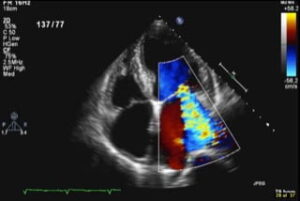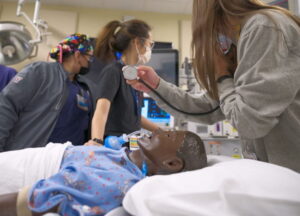Curriculum & Didactics
The curriculum at the UW Anesthesiology program includes weekly full-day didactic sessions, simulation sessions in the state-of-the-art WISH lab, mock orals trainings twice a year, plus workshops and journal clubs in the evenings.
Didactics Sessions
Weekly didactics are led by our expert faculty. CA1s participate in a basic anesthesia “bootcamp” in July and August with full day didactics (8am-4:30pm). Beginning in late August, didactics rotate between the CA1, CA2, and CA3 classes. Didactics include simulations, Point of Care Ultrasound (POCUS), practice mock orals and OSCEs, and Core Lectures.
In addition, each clinical subspecialty leads their own didactics sessions. Most occur in the morning and supplement clinical learning on the rotations. The department holds POCUS case reviews monthly and periodically hosts workshops and journal clubs.
Point of Care Ultrasound (POCUS) Training
 We consider ultrasound training, namely image acquisition, interpretation, and knowledge application to be fundamental to the residency training program.
We consider ultrasound training, namely image acquisition, interpretation, and knowledge application to be fundamental to the residency training program.
Our program includes a comprehensive online series of video lectures and modular assessments paired with hands-on training in the form of simulation sessions and bedside scanning opportunities with expert proctoring. POCUS training is supplemented with case conferences, question and answer sessions, and knowledge assessment tools. We monitor resident participation in ultrasound cases and evaluations to ensure residents successfully complete the program and graduate with the skills necessary to incorporate point of care ultrasound in a safe and effective way into their clinical practice.
Simulation Training

We have a state-of-the-art anesthesia simulator and a comprehensive program of simulation sessions for residents addressing critical incident management, Point of Care Ultrasound, TEE, ACLS bootcamps, Regional Anesthesia workshops, fiberoptic bronchoscopy, teamwork, and communication skills. Details about our simulation center are available on the WWAMI Institute for Simulation in Healthcare (WISH) website.
Mock Oral Board Sessions
We prepare our residents for oral board exams with mock sessions held twice a year. Every resident has a 1:1 practice session with a faculty member. Following the session, the faculty member provides feedback on the resident’s performance and suggestions for improvement.
Workshops & Journal Clubs
Residents are invited to attend bi-monthly continuous quality improvement sessions at Harborview Medical center and UW Medical Center- Montlake. Residents may also take advantage of evening workshops and journal clubs led by faculty.
View a sample curriculum by year below.
CA1 Year
- POCUS
- Airway Evaluation and management
- Pharmacology and practical applications of inhalational agents
- Pharmacology of opioids
- Ultrasound guided vascular access
- IV anesthetics
- Inhalational agents
- Pre-Op evaluation
- Neuromuscular blockers
- PONV prophylaxis
- Blood gas station
- Temperature regulation physiology
- Fluid therapy
- Basics of mechanical ventilation and respiratory physiology
- Anesthesia machine
- PBLDs on many different topics
- ACLS
- Vasopressors and sympathetic/parasympathetic systems
- Upper and lower extremity blocks
- Regional anesthesia workshop
- Preop assessment of the critically ill patient
- Epidural placement
- The basics of OB Anesthesia
- The basics of Pediatric Anesthesia
- DNR and Advanced Care Planning
CA2 Year
- POCUS
- Anesthesia for CEA and AAA
- Anesthesia for cardiac surgery and basic TEE
- Geriatric Anesthesia
- Perioperative Management of Ischemic Heart Disease
- Neuro Jeopardy
- Surgical Airway
- Pulmonary medicine in Critical Care
- Anesthesia Infection Prevention
- Neuromuscular Disease
- CICO/Surgical Airway
- Anesthesia for cardiac surgery and basic TEE
- Anesthesia for heart and lung transplant
- Anesthesia for AAA
CA3 Year
|